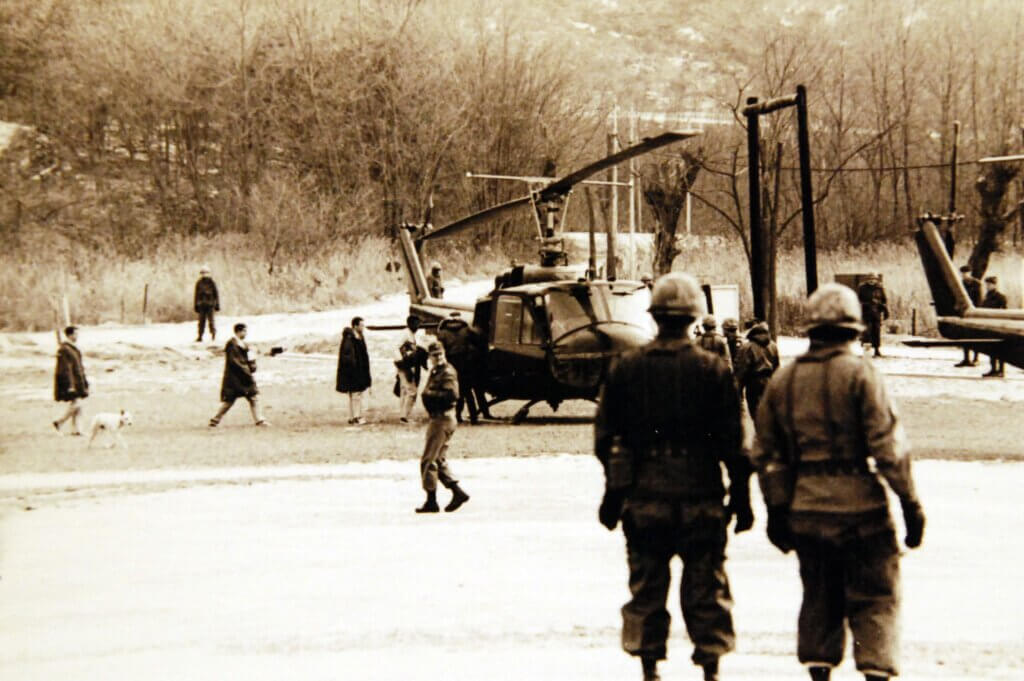Rick Rogala was only 19 years old when he became a prisoner of war. One of 83 crewmen aboard the USS Pueblo, Rogala was held captive by North Korean soldiers for 11 months. And despite a fund existing to compensate victims of state-sponsored terrorism, he and his shipmates have only received four-tenths of 1% of the money they are owed.
“Jan. 23, 1968, that’s a day I’ll never forget,” said Rogala, who enlisted in the Navy Reserve on Sept. 1, 1966. “Five torpedo boats and two airplanes surrounded the ship and wound up taking us. We had nothing to fight back with.”
Rogala, 76, said the USS Pueblo was on a non-risk mission and he thought they’d be released pretty quickly. During the capture, one crewmember was killed and seven suffered shrapnel wounds.
“What I know now, I never would have went,” he said. “It was a bad situation all the way around.”
Held captive
The Pueblo crew was taken to Pyongyang, North Korea, and the commanding officer was separated from the rest of the crew, according to a 2017 report from the Naval Health Research Center.
“Crew members were threatened with death, interrogated, and some were severely beaten,” Navy Capt. Raymond C. Spaulding wrote in the report. “‘Confessions’ as to ‘criminal aggressive acts’ were obtained from all crew members as a result of these threats and ill-treatment.”
For most of his captivity, Rogala said, he was in a room with seven other crewmen.
“On days when I was down, another crewman would be up and we did things to cheer each other up on down days,” Rogala said.
One crewmate remembered music and wrote out lyrics of songs from the ’60s. The biggest problem, according to Rogala, was that they thought they were going to be released soon.
“After about a month, we started thinking we’ll be there forever,” Rogala said. “Each of us had to basically hold each other up and say good things and positive things.”
Once released and returned home in December 1968, Rogala said family members and then-Gov. Ronald Reagan greeted the crew in San Diego.
“On the way after arriving at the airport, we spent an hour or two just kind of reminiscing about being away and everything,” Rogala said. “But one real dreadful moment was when they brought out the 83rd crewmen. He came out in a box.”
USS Pueblo survivors sue for compensation
About 17 years later, surviving Pueblo crewmen began holding reunions. At their 2015 gathering, attorney Mark Bravin, a partner with Mitchell Silberberg & Knupp LLP, told the men they could have a potential lawsuit against North Korea if the president designated North Korea a terrorist country.
Bravin, who began working with Pueblo survivor Tom Massie a year prior, said via email that survivors and their families dealt with the effects of the crew’s physical and psychological injuries for decades without compensation.
RELATED: Iraq War: A conflict that defined the National Guard
“Although Congress had created a right to sue a State Sponsor of Terrorism in 2008, North Korea was delisted that same year as part of a political deal to stop their nuclear weapons program,” Bravin said.
President Donald Trump returned North Korea to the list in November 2017, two years after Congress established the U.S. Victims of State Sponsored Terrorism (USVSST) Fund. The fund was intended to compensate “a specific group of international terrorism victims harmed by state-sponsored terrorism,” the fund’s website stated.
Bravin’s suit, John Doe A-1 et al. v. Democratic People’s Republic of Korea, resulted in a 2021 judgment of $1.15 billion in punitive damages and $1.15 billion in compensatory damages.
“It was a tremendous amount of work and required an enormous effort by a large team of attorneys in my law firm,” Bravin said. “But so far these deserving people have not been able to be compensated adequately.”
Though awarded damages, Rogala said it didn’t mean much.
“It was like, ‘Show me the money,’” he said. “… I really didn’t expect much, but it was a step in the right direction.”
That first payment in 2023 of 0.4% of the total compensation was “too small to be meaningful,” Bravin said.
“Most of these folks are in personal financial situations where receiving a reasonable percentage of their judgments would have a real impact on the quality of their lives,” Bravin said. “But it hasn’t happened yet and that is disappointing.”
Fund the fund
Mary Patrice Brown, special master of the USVSST Fund, said in a Dec. 29, 2023, message on the fund’s website that more than $6 billion has been paid since the fund was established. However, a July 2023 announcement stated there would be “insufficient funds” to authorize another round of payments by Jan. 1, 2024.
The only solution to help survivors receive compensation, according to Bravin, is for Congress to “fund the fund.” More than a dozen senators have co-sponsored a measure in a bipartisan effort, he said. However, as of early February, legislators were waiting for a Department of Justice report “expressing no objection before they introduce the bill.”
“The bill would transfer $2.5 billion to the Fund from a settlement between the U.S. government and the Chinese cryptocurrency company Binance, which sold crypto coins to investors in Iran,” Bravin said. “It also would create a mechanism for additional money to be deposited in the fund every year, making it possible for the fund to distribute payments to victims and their families every year. It is a hugely important piece of legislation that deserves to be passed into law in the coming months.”
Bravin introduced a letter in December and, according to Rogala, asked survivors at their reunion in September to call their congressmen and senators or speak to them in person.
“Tell them that you want this bill to pass,” Rogala said, “that we waited 56 years for something that was done to us at an early age that affected all our lives.”

